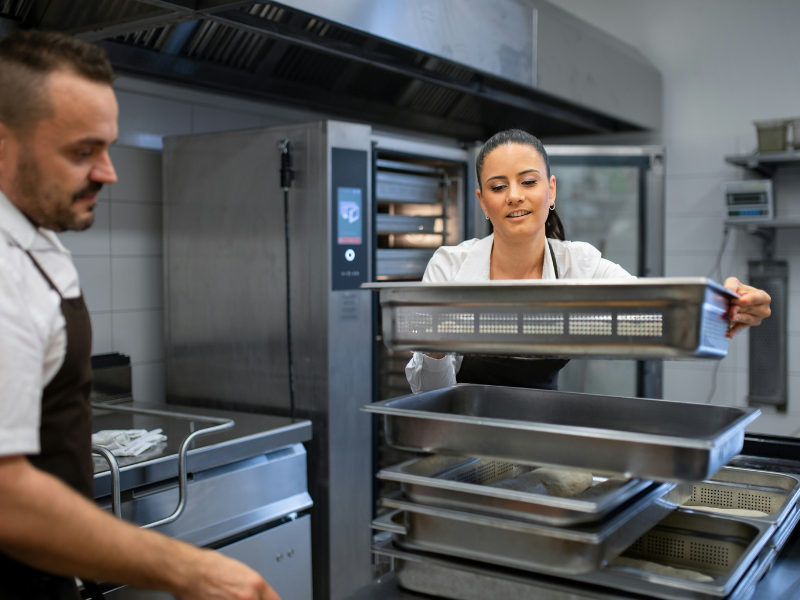Everything You Need to Know About Different Types of Alternative Kitchens
Table of Contents
CloudKitchens
How many tacos can be delivered from a 1000sqft restaurant?
The same amount as a 200sqft ghost kitchen.
Discover the key features, benefits, and uses of each alternative kitchen model to find the perfect fit for your food business.
Alternative kitchens are spaces dedicated exclusively to preparing food for delivery, without any in-person service. This format emerged to meet a market that demands increasing speed and efficiency in food delivery.
Besides reducing fixed costs, these kitchens offer greater flexibility to experiment with new menus and expand operations without major investments. For this reason, they have become a key strategy for restaurants looking to grow in the digital space.
Today, online orders already make up 40% of all foodservice revenue. Below, you’ll find a guide presenting the different types and benefits of alt kitchens to help you determine which one fits your business best.
Read more: Five types of Ghost Kitchens you didn’t know about
What Are Virtual Kitchens and Why They’re Trending
In 2021, delivery revenue surpassed $22.4 billion, according to Bloomberg. Since 2014, online sales have grown 300% faster than on-premise sales.
CB Insights projects that the global food delivery market will reach $320 billion by 2029. This outlook highlights the potential and importance of alternative kitchens in the industry.
These food facility models bring greater efficiency and cost reduction by eliminating expenses with dining areas and in-person service. Additionally, they offer flexibility to adapt menus and operate multiple brands with lower investments.
Because of these advantages, alternative kitchens stand out as an essential strategy for restaurants aiming to grow in the digital market. They directly respond to new consumer demands for speed and convenience.
Benefits of Alt Kitchens for Growing Brands
Alt kitchens offer several advantages for small businesses and expanding brands. Below are the main benefits that make this model a strategic option for those wanting fast growth with lower investment:
- Lower initial investment: While traditional spaces may require around US$ 1 million to start, alternative kitchens like CloudKitchens start from about US$ 30,000. This lowers the financial risk for small businesses looking to grow.
- Rapid scalability: Alt kitchens enable increased production and higher demand fulfillment without major construction or structural changes. Growing brands can scale faster and more efficiently.
- Operational flexibility: With fewer physical constraints, these models allow experimenting with new menus and formats without significant extra costs. This helps adapt the business to market trends and consumer preferences.
- Reduced fixed costs: Without the need for dining areas, decor, or front-of-house staff, rent and staffing expenses are lower. This savings increases profit margins for emerging brands.
- Delivery-focused: Designed specifically for delivery, alt kitchens optimize processes and logistics. Businesses improve customer experience and stand out from the competition.
Comparing the Most Common Alt Kitchen Models
The alternative kitchen market features various formats to meet specific business needs. Each model has its own benefits and characteristics, ranging from shared spaces to mobile and temporary kitchens.
Here are the most common types and how they work in practice:
Ghost Kitchens
Ghost kitchens are dedicated solely to food preparation for delivery, with no dine-in service. They provide a fully optimized setup for delivery operations, supported by technology and specialized teams to ensure speed and quality.
- Operational support with dedicated delivery teams.
- Fully equipped with professional appliances and climate control.
- Integrated technology for efficient order management.
Commissary Kitchens
Commissary kitchens are shared spaces that entrepreneurs can rent for food prep and storage. This model suits those operating multiple locations, like food truck owners, offering flexible access without owning a kitchen.
- Flexible rental based on demand and schedule.
- Lower operating costs with no property ownership required.
- Basic equipment ready for quick startup.
Kitchen Pods
Kitchen pods are mobile units, often shipping containers converted into kitchens. They can be moved to locations like parking lots or behind restaurants, helping expand delivery reach despite limited space and ventilation.
- Enable cooking at various locations, such as parking lots.
- Compact and easy to transport.
- Space and ventilation limitations that challenge large orders.
Incubator Kitchens
Also called pop-up kitchens, incubators are temporary setups attached to restaurants, food trucks, or kiosks. They help split production between dine-in and delivery, improving efficiency and allowing concept testing with low investment.
- Divides workload between delivery prep and in-person service.
- Dedicated space exclusively for delivery orders.
- Flexibility to test multiple brands in one location.
Which Format Suits Your Business Model
Each type of delivery kitchen suits different business profiles, depending on size, order volume, and service model. Choosing the right format is key to ensuring efficiency and driving growth.
Ghost kitchens fit brands handling high online order volumes and focused solely on delivery. They provide full infrastructure and integrated technology for fast, efficient operations.
Commissary kitchens work well for small or early-stage businesses needing flexible space and hours. They’re also good for multi-location operators like food trucks that require prep and storage space.
Kitchen pods suit businesses that need mobility and want to expand their geographic reach. They’re best for smaller operations without large simultaneous order demands, cooking in strategic spots like events.
Incubator kitchens benefit those testing new brands or concepts without large investments. They assist restaurants in splitting delivery and dine-in production with agility and flexibility.
Read more: Ghost Kitchens as CPUs: Use-cases of Your Business’s Next Step

CloudKitchens as a Flexible Alt Kitchen Solution
CloudKitchens stands out as a modern, flexible solution for growth in the delivery market. Our ghost kitchen model combines advanced technology with efficient logistics, streamlining order and delivery management.
With the platform, restaurants gain access to fully equipped kitchens and operational support. Key benefits include:
- Integrated technology: A unified system that allows restaurants to manage and track all orders in real time, minimizing mistakes and streamlining the entire delivery process. This technology improves accuracy and enhances operational efficiency.
- Efficient logistics: A dedicated team focused on optimizing the flow of deliveries, ensuring that orders are prepared, handed off, and delivered quickly and reliably. This helps businesses maintain high customer satisfaction through timely service.
- Complete infrastructure: Kitchens fully equipped with professional-grade appliances, climate control systems, and all necessary facilities ready for immediate use. This setup supports consistent food quality and smooth daily operations.
- Operational support: Comprehensive assistance with routine tasks such as cleaning, maintenance, and security, allowing restaurant staff to concentrate fully on food preparation and customer service without distractions.
- Low initial investment: A cost-effective model that eliminates the need for expensive real estate purchases or renovations, making it easier for businesses to start or expand without heavy upfront costs.
- Flexibility: Designed to accommodate a wide variety of food businesses, from small food trucks to large restaurant chains, offering scalable options that support fast growth and easy adaptation to market demands.
Find the Right Alt Kitchen Setup With CloudKitchens
If you’re looking for a practical, efficient way to grow your delivery business, CloudKitchens offers various alternative kitchen options. With strategically located units, you can select the space that best fits your profile and needs.
The platform also provides personalized guidance to help you make the best choice and optimize your operation from the start. Take advantage of this opportunity to accelerate your restaurant’s growth with a flexible, innovative model.
Discover CloudKitchens’ available locations and find the ideal kitchen setup for your business on their official website. Explore locations and learn more to expand your business.
FAQ – Alternative Kitchens
What exactly is considered an alternative kitchen?
Alternative kitchens include any non-traditional food preparation spaces, such as ghost kitchens, shared kitchens, or mobile kitchens, designed to meet specific business needs.
Which type of alternative kitchen is best for a startup?
It depends on your goals, budget, and business model. Shared kitchens are often the most affordable for beginners, while ghost kitchens work well for delivery-focused brands.
Are alternative kitchens fully licensed and compliant with regulations?
Most reputable providers ensure their spaces meet local health and safety standards, but it’s essential to verify licenses and requirements before signing a lease.
DISCLAIMER: This information is provided for general informational purposes only and the content does not constitute an endorsement. CloudKitchens does not warrant the accuracy or completeness of any information, text, images/graphics, links, or other content contained within the blog content. We recommend that you consult with financial, legal, and business professionals for advice specific to your situation.
More insights & stories
There’s more where that came from.
Get in the know and check out our additional insights



